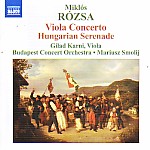Miklós Rózsa’s Viola Concerto is a masterpiece, certainly one of the finest solo and orchestra pieces ever conceived for the instrument. Written in four ample movements, richly orchestrated (as you might expect) and just as rich in contrast and tuneful appeal, it’s also impressive for Rózsa’s sure handling of form in the large (14-minute) initial Moderato assai. Aside from a touch of shaky ensemble in the middle of the finale, the performance here is excellent, with Gilad Karni a splendidly warm and full-throated soloist. He’s all the more impressive for being somewhat dryly recorded, but this isn’t a serious issue. The Viola Concerto has been recorded previously, most notably for Koch, but this version is every bit as good.
The Hungarian Serenade is a charmer in the form of five “character pieces”–a march, serenata, scherzo, notturno, and final danza. Rózsa never really needed the moniker “Hungarian”, since all of his music sounds recognizably ethnic, even his score to Ben Hur. Once again the performance is lovely, relaxed but never rhythmically slack–just allowing us time to savor the work’s spicy harmonies and vivid instrumental color. An easy recommendation, this, and a welcome boost to the growing recognition that Rózsa’s concert music surely deserves. [2/23/2009]
































